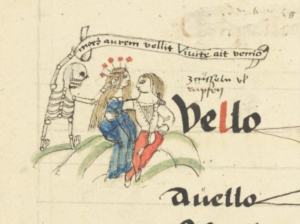Put not oph till to-morrow what can be enjoyed to-day.
[Put not off till tomorrow what can be enjoyed today.]
Josh Billings (1818-1885) American humorist, aphorist [pseud. of Henry Wheeler Shaw]
Everybody’s Friend, Or; Josh Billing’s Encyclopedia and Proverbial Philosophy of Wit and Humor, ch. 148 “Affurisms: Ink Brats” (1874)
(Source)
Quotations about:
seize the day
Note not all quotations have been tagged, so Search may find additional quotes on this topic.
Since Joys are so uncertain; take Gladness when it comes.
Thomas Fuller (1654-1734) English physician, preacher, aphorist, writer
Introductio ad Prudentiam, Vol. 1, # 101 (1725)
(Source)
Come, let us live and love, my dear,
A fig for all the pratings drear
Of sour old sages, worldly wise.
Aye, suns may set again to rise;
But as for us, when once our sun
His little course of light has run,
An endless night we’ll sleep away.
[Vivamus, mea Lesbia, atque amemus
rumoresque senum severiorum
omnes unius aestimemus assis
soles occidere et redire possunt:
nobis cum semel occidit brevis lux,
nox est perpetua una dormienda.]Catullus (c. 84 BC – c. 54 BC) Latin poet [Gaius Valerius Catullus]
Carmina # 5 “To Lesbia,” ll. 1-6 [tr. Stewart (1915)]
(Source)
One of Catulllus' most popular and widely-translated poems.
(Source (Latin)). Alternate translations:Come and let us live, my Deare,
Let us love and never feare
What the sourest Fathers say:
Brightest Sol that dyes to-day
Lives againe as blithe to-morrow;
But if we darke sons of sorrow
Set, ô then, how long a Night
Shuts the Eyes of our short light!
[tr. Crashaw (1648)]Lesbia, live to love and pleasure,
Careless what the grave may say:
When each moment is a treasure
Why should lovers lose a day?
Setting suns shall rise in glory,
But when little life is o'er,
There's an end of all the story --
We shall sleep, and wake no more.
[tr. Langhorne (c. 1765)]Let's live, and love, my darling fair!
And not a single farthing care
For age's babbling spite;
Yon suns that set again shall rise,
but, when our transient meteor dies,
We sleep in endless night.
[tr. Nott (1795)]My Lesbia, let us love and live,
And to the winds, my Lesbia, give
Each cold restraint, each boding fear
Of age and all her saws severe.
Yon sun now posting to the main
Will set -- but 'tis to rise again: --
But we, when once our mortal light
Is set, must sleep in endless night!
[tr. Coleridge (1798)]Love, my Lesbia, while we live,
Value all the cross advice
That the surly greybeards give
At a single farthing's price.
Suns that set again may rise;
We, when once our fleeting light,
Once our day in darkness dies,
Sleep in one eternal night.
[tr. Lamb (1821)]Live we, love we, Lesbia dear,
And the stupid saws austere,
Which your sour old dotards prate,
Let us at a farthing rate!
When the sun sets, ' tis to rise
Brighter in the morning skies;
But, when sets our little light,
We must sleep in endless night.
[tr. T. Martin (1861)]The while we live, to love let's give
Each hour, my winsome dearie!
Hence, churlish rage of icy age!
Of love we 'll ne'er grow weary.
Bright Phoebus dies, again to rise;
Returns life's brief light never;
When once 'tis gone, we slumber on
For ever and for ever.
[tr. Cranstoun (1867)]Living, Lesbia, we should e'en be loving.
Sour severity, tongue of eld maligning,
All be to us a penny's estimation.
Suns set only to rise again to-morrow.
We, when sets in a little hour the brief light,
Sleep one infinite age, a night for ever.
[tr. Ellis (1871)]Love we (my Lesbia!) and live we our day,
While all stern sayings crabbed sages say,
At one doit's value let us price and prize!
The Suns can westward sink again to rise
But we, extinguished once our tiny light,
Perforce shall slumber through one lasting night!
[tr. Burton (1893)]Let us live, my Lesbia, and let us love, and count all the rumors of stern old men at a penny's fee. Suns can set and rise again: we when once our brief light has set must sleep through a perpetual night.
[tr. Smithers (1894)]Come, my Lesbia, no repining;
Let us love while yet we may!
Suns go on forever shining;
But when we have had our day,
Sleep perpetual shall o'ertake us,
And no morrow's dawn awake us.
[tr. Field (1896)]Let us live, my Lesbia, and love, and value at one farthing all the talk of crabbed old men.
Suns may set and rise again. For us, when the short light has once set, remains to be slept the sleep of one unbroken night.
[tr. Warre Cornish (1904)]Let us live, my Lesbia, let us love, for the reprobation of soured age let us not care a sou. Suns can set and rise again; but to our brief light, when once it sets, there comes a never-ending night that must be passed in never-ending sleep.
[tr. Stuttaford (1912)]We live, Lesbia,
And we love, Lesbia,
And what do we care what the world may say?
The sun goes down,
And the sun comes up,
But our little lives pass away
In a day,
Our poor little lives pass away.
[tr. Dement (1915)]Let us revel in life and love, my darling;
All that crabbed antiquities say idly
We will value together at a farthing.
Suns may set , and return again as brightly:
When our light to its dying spark has fluttered,
We must sleep an eternity of slumber.
[tr. Symons-Jeune (1923)]O! let us love and have our day,
All that the bitter greybeards say
Appraising at a single mite.
My Lesbia , suns can set and rise:
For us the brief light dawns and dies
Once only, and the rest is night.
[tr. MacNaghten (1925)]Come let us live and let us love,
And the stern voice of censors prove,
Who bid us from our loving cease,
Exactly worth a penny piece.
For suns can rise and suns can wane
And on the morrow rise again;
But when our one brief day is gone,
For ever we must sleep alone.
[tr. Wright (1926)]Come, Lesbia, let us live and love,
nor give a damn what sour old men say.
The sun that sets may rise again
but when our light has sunk into the earth,
it is gone forever.
[tr. Gregory (1931)]Lesbia, let us live only for loving,
and let us value at a single penny
all the loose flap of senile busybodies!
Suns when they set are capable of rising,
but at the setting of our on brief light
night is one sleep from which we never awaken.
[tr. C. Martin (1979)]Let us live, my Lesbia, let us love,
and all the words of the old, and so moral,
may they be worth less than nothing to us!
Suns may set, and suns may rise again:
but when our brief light has set,
night is one long everlasting sleep.
[tr. Kline (2001)]Let us live, my Lesbia, and let us love,
and let us judge all the rumors of the old men
to be worth just one penny!
The suns are able to fall and rise:
When that brief light has fallen for us,
we must sleep a never ending night.
[tr. Negenborn (1997)]Let's live, Lesbia mine, and love --
and as for scandal, all the gossip, old men's strictures,
value the lot at no more than a farthing!
Suns can rise and set ad infinitum --
for us, though, once our bref life's quenched,
there's only one unending night that's left to sleep through.
[tr. Green (2005)]Come live with me, Lesbia, and be my love,
And ignore the wagging tongues
Of wilted crones and toothless geezers.
Suns rise and set, rise and set again,
But we, when our brief light is blacked,
Must sleep forever, and then forever.
[tr. Hager (2006)]My Lesbia, let’s live and let’s love,
Let all the rumors of harsh old men
count for only a penny.
Suns can set and rise again:
but when our brief light sets
we must sleep a lonely endless night.
[tr. @sentantiq (2015)]Let us live, my Lesbia, and let us love,
and let's value all the rumors
of rather stern old men as one penny!
Suns can set and return;
as for us, once our brief light sets,
there is one perpetual night to be slept.
[tr. Wikibooks (2017)]Let us live, my Lesbia, and let us love,
and let us value all the rumors of
more severe old men at only a penny!
Suns are able to set and return:
when once the short light has set for us
one perpetual night must be slept by us.
[tr. Wikisource (2018)]
Compare also these two pieces, which start modeled after Catullus (as shown):My sweetest Lesbia, let us live and love;
And though the sager sort our deeds reprove,
Let us not weigh them: Heaven's great lamps do dive
Into their west, and straight again revive,
But, soon as once set is our little light,
Then must we sleep one ever-during night.
[Thomas Campion, A Book of Airs (1601)]Come my Celia, let us prove,
While we can, the sports of love;
Time will not be ours forever,
He at length our good will sever.
Spend not then his gifts in vain;
Suns that set may rise again,
But if once we lose this light,
'Tis with us perpetual night.
[Ben Jonson, Volpone, Act 3, sc. 6 (1616)]
Pleasing for a moment is of some consequence; for, if we take care of the moments, the years will take care of themselves, you know.
Maria Edgeworth (1768-1849) Anglo-Irish writer, novelist
Mademoiselle Panache, Part 2 [Helen] (1795)
(Source)
The only way to forget time is to make use of it.
[On ne peut oublier le temps qu’en s’en servant.]
Charles Baudelaire (1821-1867) French poet, essayist, art critic
Journaux Intimes [Intimate Journals], “Mon cœur mis à nu [My Heart Laid Bare],” § 111 (1864–1867; pub. 1887) [tr. Sieburth (2022)]
(Source)
(Source (French)). Alternate translations:One can only forget Time by making use of it.
[tr. Isherwood (1930)]One can only forget about time by making use of it.
[Common, e.g.]
So whatever you want to do, just do it. Don’t worry about making a damn fool of yourself. Making a damn fool of yourself is absolutely essential. And you will have a great time.
Gloria Steinem (b. 1934) American feminist, journalist, activist
Commencement address, Tufts University (1987-05-17)
(Source)
Boy! let my cup with rosy wine o’erflow,
Above the melting of the summer snow:
Let my wet hair with wasteful odour shine,
And loads of roses round my temples twine:
Tombs of the Caesars, your sad honours cry,
“Live, little men, for lo! the gods can die.”[Sextantes, Calliste, duos infunde Falerni,
Tu super aestivas, Alcime, solve nives,
Pinguescat nimio madidus mihi crinis amomo
Lassenturque rosis tempora sutilibus.
Tam vicina iubent nos vivere Mausolea,
Cum doceant, ipsos posse perire deos.]Martial (AD c.39-c.103) Spanish Roman poet, satirist, epigrammatist [Marcus Valerius Martialis]
Epigrams [Epigrammata], Book 5, epigram 64 (5.64) (AD 90) [tr. Hodgson (1809)]
(Source)
Martial could see the Mausoleum of Augustus from his house on the Quirinal.
"Summer snow" was snow preserved (or transported from the mountains) until the summer, used like ice to cool drinks.
(Source (Latin)). Alternate translations:You, boy, two measures of brisk wine let flow,
And you, pour on it summer cooling snow;
Let my moist hairs with rich perfumes abound,
With loads of rosy wreaths my temples crown'd:
"Live now," our neighbouring stately tombs do cry,
"Since kings, you see (your petty gods), can die.
[16th C Manuscript]Two cups, Calistus, of rich wine fill thou,
Thou Alcimus, allay 't with summer snow.
Let my moist haire with richest oyntment sweat;
And sweet rose chaplets on my Temples set.
Come, let us live; the Caesars tombes so nigh
Teach us that even the gods themselves will dye.
[tr. May (1629), 3.65]Twice four Falernians, dear Callistus, pour:
Diffuse, my Alcimus, the snowy show'r.
Bid my locks fatten with enormous oil:
With textur'd roses make my temples toil.
We learn to live from Mausoleums by,
Which teach us that the gods themselves can dy.
[tr. Elphinston (1782), Book 7, ep. 73]Fill high the bowl with sparkling wine;
Cool the bright draught with summer snow.
Amid my locks let odours flow;
Around my temples roses twine.
See yon proud emblem of decay,
Yon lordly pile that braves the sky!
It bids us live our little day,
Teaching that gods themselves may die.
[tr. Merivale (1838)]Fill the double-cyathi cujps with Falernian, pour summer-snow over the wine, let our hair be wet with unstinted perfume, and our temples be loaded with chaplets of roses. The adjacent Mausolea teach us how to live, for they show that even gods can die.
[tr. Amos (1858), 5.65]Fill double cups of Falernian, Callistus; dissolve into it, Alcimus, the summer snow. Let my hair drip richly with abundance of nard, and my temples be encircled with wreaths of roses. The Mausoleums, close at hand, bid us live, for they teach us that even gods can die.
[tr. Bohn's Classical (1859)]Pour in, Callistus, two double-measures of Falernian; do thou, Alciums, dissolve upon them the summer's snow; let my dripping locks be rich with over-bounteous balm, and my temples droop beneath the knitted roses. Your tombs, so nigh, bid us enjoy life, forasmuch as they teach us that the very gods can die.
[tr. Ker (1919)]Slave, a full draught of vintage fine,
And bid thy comrade cool the wine,
Let snow its heat allay;
Twine rosy wreaths to deck my head,
Nard shall its precious fragrance shed
To crown my locks to-day;
For Caesar’s tomb that standeth nigh
Doth warn that even gods can die,
I’ll live while yet I may.
[tr. Pott & Wright (1921), "Carpe Diem"]Callistus, pour two bumpers, pour them neat;
Melt, Alcimus, the snow to quench their heat.
In oozy spikenard steep your perfumed hair
And bow my head with rosy garlands fair.
From yonder Mausoleum breathes the sigh,
"Live while thou mayest, gods themselves must die."
[tr. Francis & Tatum (1924), ep. 259]Pour in an extra cup of dark Falernian.
Strain it through the summer's snow and chill.
Anoint my dripping hair with fragrant perfume,
And crown my head with roses, if you will.
The Mausoleum of divine Augustus
Looming close, so very close nearby,
Orders us to live and love existence
Since even gods themselves decline and die.
[tr. Marcellino (1968)]Callistus, pour in a double double of Falernian. Alcimus, melt summer snow over it. Let my soaked hair be sleek with an excess of unguent and my temples wearied by stitched roses. The Mausoleum so close at hand tells us to live, teaching that the very gods can perish.
[tr. Shackleton Bailey (1993)]Pour me a double measure, of Falernian, Callistus,
and you Alcimus, melt over it summer snows,
let my sleek hair be soaked with excess of perfume,
my brow be wearied beneath the sewn-on rose.
The Mausoleum tells us to live, that one nearby,
it teaches us that the gods themselves can die.
[tr. Kline (2006)]Callistus, pour me a double of Falernian.
Chill it, Alcimus, with summer snows.
Sleek my damp hair with ample oil of cardamom,
and weight my brows with garlands made of rose.
The Mausoleum of Caesar, so close by,
says, "Live it up, for even gods can die."
[tr. McLean (2014)]
The terrible events of life are great eye-openers. They force us to learn that which it is wholesome for us to know, but which habitually we try to ignore — namely, that really we have no claim on a long life; that we are each of us liable to be called off at any moment, and that the main point is not how long we live, but with what meaning we fill the short allotted span — for short it is at best.
Felix Adler (1851-1933) German-American educator
Life and Destiny, Lecture 8 “Suffering and Consolation” (1903)
(Source)
Life begins when a person first realizes how soon it will end.
Marcelene Cox (1900-1998) American writer, columnist, aphorist
“Ask Any Woman” column, Ladies’ Home Journal (1949-05)
(Source)
Cleverness is not wisdom,
nor is thinking thoughts that are not mortal.
Life is short; this being so,
who would pursue great things
and not bear with what is at hand? These
are the ways of madmen and
men of evil counsel, at least
in my judgment.[τὸ σοφὸν δ’ οὐ σοφία,
τό τε μὴ θνατὰ φρονεῖν
βραχὺς αἰών· ἐπὶ τούτωι
δὲ τίς ἂν μεγάλα διώκων
τὰ παρόντ’ οὐχὶ φέροι; μαι
νομένων οἵδε τρόποι καὶ
κακοβούλων παρ’ ἔμοιγε φωτῶν.]Euripides (485?-406? BC) Greek tragic dramatist
Bacchæ [Βάκχαι], l. 395ff (Stasimon 1, Antiphon/Antistrophe 1) [Chorus/Χορός] (405 BC) [tr. Kirk (1970)]
(Source)
The chorus of Bacchantes is playing with the similarly-rooted sophon (cleverness) and sophia (wisdom). (Source (Greek)). Alternate translation:That science which beyond the scope
Of frail humanity aspires.
Haunts not the bosom of the Sage.
Short is life, and they who follow
Ambition's splendid treacherous lure
Taste not the blessings of the present hour:
I deem their conduct frantic and unwise.
[tr. Wodhull (1809)]But cleverness is not wisdom, nor is thinking on things unfit for mortals. Life is short, and on this account the one who pursues great things does not achieve that which is present. In my opinion, these are the ways of mad and ill-advised men.
[tr. Buckley (1850)]Beyond the range of mortal eyes
'Tis not wisdom to be wise.
Life is brief, the present clasp,
Nor after some bright future grasp.
Such were the wisdom, as I ween,
Only of frantic and ill-counseled men.
[tr. Milman (1865)]That wisdom is not wise Which aims beyond man’s power.
Short is our life; to grasp at much is but to lose the present good, --
And this to me seems like the deed of frenzied and of foolish men.
[tr. Rogers (1872), l. 378ff]Ah, not with knowledge is Wisdom bought;
And the spirit that soareth too high for mortals
Shall see few days: whosoever hath caught
At the things too great for a man's attaining,
Even blessings assured shall he lose in the gaining.
Such paths as this, meseemeth, be sought
Of the witless folly that roves distraught.
[tr. Way (1898)]But the world's Wise are not wise,
Claiming more than mortal may.
Life is such a little thing;
Lo, their present is departed,
And the dreams to which they cling
Come not. Mad imagining
Theirs, I ween, and empty-hearted!
[tr. Murray (1902)]Sophistry is not wisdom, and to indulge in thoughts beyond man’s ken is to shorten life; and if a man on such poor terms should aim too high, he may miss the pleasures in his reach. These, to my mind, are the ways of madmen and idiots.
[tr. Coleridge (1907)]And what passes for wisdom is not;
unwise are those who aspire,
who outrange the limits of man.
Briefly, we live. Briefly,
then die. Wherefore, I say,
he who hunts a glory, he who tracks
some boundless, superhuman dream,
may lose his harvest here and now
and garner death. Such men are mad,
their counsels evil.
[tr. Arrowsmith (1960)]To know much is not to be wise.
Pride more than mortal hastens life to its end;
And they who in pride pretend
Beyond man's limit, will lose what lay
Close to their hand and sure.
I count it madness, and know no cure can mend
The evil man and his evil way.
[tr. Vellacott (1973)]Wisdom is not what is wise,
nor to think non-mortal thoughts.
Life is fleeting; can it be, then, that one seeks after what is greater,
not accepting circumstance?
These are the manners of a madman and, to me, of evil counsel'd persons.
[tr. Neuburg (1988)]A knowing mind that ignores its own limits
has a very short span. And the man
who aims too high
never reaps what lies within his grasp.
Such is the folly --
and I know none worse --
of perversely ambitious, fanatical men.
[tr. Cacoyannis (1982)]But shallow wisdom is untrue.
To think beyond this life
Cuts short our life. He who
Pursues the great, forfeits
What lies at hand. Such temperaments
According to my thought, belong
To madmen and the ill-advised.
[tr. Blessington (1993)]So cleverness is not wisdom
nor is it wise to think thoughts unfit for mortals.
Life is short. Given such brevity
who would pursue ambitious ends
And lose what lies at hand?
These, in my opinion at least,
are the ways of madmen and evil counsellors.
[tr. Esposito (1998)]Wisdom? It's not wise
to lift our thoughts too high;
we are human, and our time is short.
A man who aims at greatness
will not live to own what he has now.
That, I believe, is the belief of men
whose judgment is foul.
They are insane.
[tr. Woodruff (1999)]Intellect is not wisdom.
And to think in a manner
not right for mortals means
Life will be short. Who
Would pursue great things
If doing so meant losing what
Is already his?
That is the way, as I see it,
And bad counsel, of madmen.
[tr. Gibbons/Segal (2000), l. 469ff]Cleverness is not wisdom
nor is it wise to think thoughts not mortal.
Our life is short: this being so,
a man who pursues great things
may miss what lies at hand. To live thus
is to be, in my judgment
a madman and a fool.
[tr. Kovacs (2002)]The wise are not wise if they don’t consider a human’s lot.
Life is short.
He who constantly pursues great achievements in this life, won’t have time to enjoy those he already has achieved.
So far as I can tell, these are the doings of madmen and evil minds.
[tr. Theodoridis (2005)]Cleverness is not wisdom;
Thinking heavenly
Thoughts, short life; in that case,
Who, in hunting greater things,
Would not be content with present fortune?
These are ways of men insane, with-
out understanding, so it seems to me.
[tr. Valerie (2005)]But being clever isn't wisdom.
And thinking deeply about things
isn't suitable for mortal men.
Our life is brief -- that's why
the man who chases greatness
fails to grasp what's near at hand.
That's what madmen do,
men who've lost their wits.
That's what I believe.
[tr. Johnston (2008), l. 497ff]Cleverness is not wisdom,
that over-reaching mortals
simply shorten their lives.
Life is brief enough as it is,
so hold it all to hand.
Wild ambition is a kind of madness:
stretch too hard for the summit
and you will fail and fall
and plummet back to land.
[tr. Robertson (2014)]Cleverness is not wisdom,
and neither is reaching beyond thoughts meant for mortals.
Our lives are short.
Spend all your time reaching
and you miss what’s in front of you.
This is the madman’s way.
Or at least the ill-counseled.
But that’s just my opinion.
[tr. Pauly (2019)]Cleverness is not wisdom, and those who'd seem wise as the gods -- their live will be short. Those who seek greatness will not see the snake at their feet. Mad ways set all on the road to disaster.
[tr. Behr/Foster (2019)]It is not wisdom [sophiā] to be overly sophos, and to think things unbefitting mortal men. Life is short, and in it he who pursues great things does not achieve that which is present. In my opinion, these are the ways of mad and ill-counseling men.
[tr. Buckley/Sens/Nagy (2020)]Wisdom is not wit;
Nor is thinking thoughts which belong not to mortals.
Life is brief. And because of this
Whoever seeks out great accomplishments
May not grasp the things at hand.
These are the ways of madmen
And wicked fools, I think.
[tr. @sentantiq (2021)]
KEATING: “Seize the day.” “Gather ye rosebuds while ye may.” Why does the writer use these lines?
CHARLIE: Because he’s in a hurry.
KEATING: No. Ding! Thanks for playing anyway. Because we are food for worms, lads. Because, believe it or not, each and every one of us in this room is one day going to stop breathing, turn cold, and die.
KEATING: Now I would like you to step forward over here and peruse some of the faces from the past. You’ve walked past them many times. I don’t think you’ve really looked at them. They’re not that different from you, are they? Same haircuts. Full of hormones, just like you. Invincible, just like you feel. The world is their oyster. They believe they’re destined for great things, just like many of you. Their eyes are full of hope, just like you.
Did they wait until it was too late to make from their lives even one iota of what they were capable? Because, you see gentlemen, these boys are now fertilizing daffodils. But if you listen real close, you can hear them whisper their legacy to you. Go on, lean in. Listen, you hear it?
Carpe. Carpe diem. Seize the day, boys, make your lives extraordinary.
I am all for the short and merry life.
Edward FitzGerald (1809-1883) English writer, poet, translator
Letter to Frederick Tennyson (31 Dec 1850)
(Source)
Later his epitaph.
It’s a terrible thing, I think, in life to wait until you’re ready. I have this feeling now that actually no one is ever ready to do anything. There is almost no such thing as ready. There is only now. And you may as well do it now.
Hugh Laurie (b. 1959) English actor, writer, musician, singer
Interview with Sophie Harris, Time Out: New York (1 Sep 2012)
(Source)
Pry not, the morrow’s chance to learn:
Set down to gain whatever turn
The wheel may take.
[Quid sit futurum cras, fuge quaerere, et
quem fors dierum cumque dabit, lucro
adpone.]Horace (65-8 BC) Roman poet and satirist [Quintus Horacius Flaccus]
Odes [Carmina], Book 1, # 9, l. 13ff (1.9.13-15) (23 BC) [tr. Gladstone (1894)]
(Source)
To Thaliarchus.
(Source (Latin)). Alternate translations:Upon to Morrow reckon not,
Then if it comes 'tis clearly got.
[Fanshaw (1666)]All Cares, and Fears are fond and vain,
Fly vexing thoughts of dark to-morrow;
What Chance scores up, count perfect gain,
And banish business, banish sorrow.
[tr. Creech (1684)]To-morrow and her works defy,
Lay hold upon the present hour,
And snatch the pleasures passing by,
To put them out of fortune's power:
[tr. Dryden (c. 1685)]O, ask not what the morn will bring,
But count as gain each day that chance
May give you.
[tr. Conington (1872)]Avoid inquiring what may happen to-morrow; and whatever day fortune shall bestow on you, score it up for gain.
[tr. Smart/Buckley (1853)]Let not to-morrow's change or chance
Perplex thee, but as gain
Count each new day!
[tr. Martin (1864)]Shun to seek what is hid in the womb of the morrow;
Count the lot of each day as clear gain in life’s ledger.
[tr. Bulwer-Lytton (1870)]What brings to-morrow care not to ask, and what
Fortune each day may bring, set it down as gain.
[tr. Phelps (1897)]What is to be to-morrow do not ask: appraise
As gain the course of days Fortune will yield.
[tr. Garnsey (1907)]What next morn's sun may bring, forbear to ask;
But count each day that comes by gift of chance
So much to the good.
[tr. Marshall (1908)]Cease to ask what the morrow will bring forth, and set down as gain each day that Fortune grants!
[tr. Bennett (Loeb) (1912)]Ask not the morrow's good or ill;
Reckon it gain however chance
May shape each day.
[tr. Mills (1924)]Try not to guess what lies in the future, but
As Fortune deals days enter them into your
Life's book as windfalls, credit items,
Gratefully.
[tr. Michie (1963)]Stop wondering after tomorrow: take
Day by day the days you’re granted.
[tr. Raffel (1983)]Cease to ask what tomorrow may bring
and count as gain whatever Fortune grants you today.
[tr. Alexander (1999)]Don’t ask what tomorrow brings, call them your gain
whatever days Fortune gives.
[tr. Kline (2015)]Leave off asking what tomorrow will bring, and
whatever days fortune will give, count them
as profit.
[tr. Wikisource (2021)]
BRUTUS: There is a tide in the affairs of men
Which, taken at the flood, leads on to fortune;
Omitted, all the voyage of their life
Is bound in shallows and in miseries.
On such a full sea are we now afloat,
And we must take the current when it serves
Or lose our ventures.William Shakespeare (1564-1616) English dramatist and poet
Julius Caesar, Act 4, sc. 3, l. 249ff (4.3.249-255) (1599)
(Source)
YESTERDAY This Day’s Madness did prepare;
TO-MORROW’S Silence, Triumph, or Despair:
Drink! for you know not whence you came, nor why:
Drink! for you know not why you go, nor where.Omar Khayyám (1048-1123) Persian poet, mathematician, philosopher, astronomer [عمر خیام]
Rubáiyát [رباعیات], Bod. # 26 [tr. FitzGerald, 3rd ed. (1872), # 74]
(Source)
FitzGerald used the same text for subsequent editions.
Alternate translations:Ah, fill the Cup: -- what boots it to repeat
How Time is slipping underneath our Feet:
Unborn To-morrow and dead Yesterday,
Why fret about them if To-day be sweet!
[tr. FitzGerald, 1st ed. (1859), # 37]Yesterday This Day's Madness did prepare;
To-morrow's Silence, Triumph, or Despair:
Drink! for you know not whence you came, nor why:
Drink! for you know not why you go, nor where.
[tr. FitzGerald, 2nd ed. (1868), # 80]Be on your guard, my friend, for you will be sundered from your soul, you will pass behind the curtain of the secrets of heaven. Drink wine, for you know not whence you come. Be merry, for you know not where you go.
[tr. McCarthy (1879), # 180]O soul, so soon to leave this coil below,
And pass the dread mysterious curtain through,
Be of good cheer, and joy you while you may,
You wot not whence you come, nor whither go.
[tr. Whinfield (1882), # 40]Make haste! soon must you quit this life below,
And pass the veil, and Allah's secrets know;
Make haste to take your pleasure while you may,
You wot not whence you come, nor whither go.
[tr. Whinfield (1883), # 48 or 87]Ah Brother, but a little while, and Thou shalt find
Thy Lasting Home the 'Secret Veil' behind; --
Rejoice Thy Heart and banish Grief, for know, --
Thy source, Thy Goal, has never been defined.
[tr. Garner (1887), 7.8]Ah, brother, but a little while and thou shalt find
Eternal rest, the secret veil behind;
Rejoice thy heart and banish grief, for know --
Thy source, thy goal, has never been divined. [tr. Garner (1898), # 148]'Tis a strange world we came to, You and I,
Whence no man knows, and surely none knows why,
Why we remain -- a harder question still,
And still another -- whither when we die?
[tr. Le Gallienne (1897)]Bethink thee that soulless and bare thou shalt go;
The veil of God's mysteries to tear thou shalt go:
Drink wine, for thou knowest not whence thou hast come;
Live blithe, for thou knowest not where thou shalt go.
[tr. Payne (1898), # 188]Know this --- that from thy soul thou shalt be separated,
thou shalt pass behind the curtain of the secrets of God.
Be happy -- thou knowest not whence thou hast come:
drink wine - thou knowest not whither thou shalt go.
[tr. Heron-Allen (1898), # 26]Thou shalt be parted from thy soul, and then,
Enter God's veil of mystery again;
Be glad! For whence you came you do not know;
Drink! For you wist as little where you go.
[tr. Cadell (1899), # 26]Soon shall you bid farewell to mortal tie;
Soon shall you read life's deepest mystery.
Drink, for you know not when you go, nor where;
Drink, for you know not whence you came, nor why.
[tr. Roe (1906), # 35]Since from your soul you separate, then know
Behind God's secret veil you will go, too;
Drink wine! for you know not whence you have come;
Be jocund! for you know not where you go!
[tr. Thompson (1906), # 136]Know this, that soon thou diest, and thy soul
The Book of God's Great Secret must unroll;
Be happy! knowing not whence thou hast come,
Nor whither thou shalt go. Drink out the Bowl!
[tr. Talbot (1908), # 26]Know that thou shalt depart, deprived of thy soul; thou
shalt go behind the veil of the mystery of annihilation.
Drink wine: thou knowest not whence thou art come.
Be merry! thou knowest not whither thou shalt go.
[tr. Christensen (1927), # 15]Ye go from soul asunder this ye know,
And that ye creep, behind His curtain low;
Hence sing His Name, ye know not whence ye came,
And live sedate, ye know not where to go.
[tr. Tirtha (1941), 9.99]What, without asking, hither hurried whence?
And, without asking, whither hurried hence!
Another and another cup to drown
The Memory of this impertinence.
[tr. Graves & Ali-Shah (1967)]
Why did we wait for any thing? — why not seize the pleasure at once? — How often is happiness destroyed by preparation, foolish preparation!
Jane Austen (1775-1817) English author
Emma, Vol. 2, ch. 12 (ch. 30) [Frank Churchill] (1816)
(Source)
In the moment of our talking, envious time has ebb’d away.
Seize the present; trust tomorrow e’en as little as you may.
[Dum loquimur, fugerit invida
aetas: carpe diem, quam minimum credula postero.]Horace (65-8 BC) Roman poet and satirist [Quintus Horacius Flaccus]
Odes [Carmina], Book 1, # 11, l. 8ff (1.11.8-9) (23 BC) [tr. Conington (1872)]
Often titled "To Leuconoë." This is the source of the famous phrase, "carpe diem," commonly translated "seize the day." Many scholars give it a more horticultural spin, to harvest the day now, while it is ripe. More discussion here. More quotations along this theme here.
(Source (Latin)). Alternate translations:Whilest we are talking, envious Time doth slide:
This day's thine own, the next may be deny'd.
[tr. Sir T. H.; ed. Brome (1666)]Time, while we speak on't flyes; now banish sorrow,
Live well to day, and never trust to morrow.
[tr. S. W., Esq.; ed. Brome (1666)]E'en whil'st we speak the Envious time
Doth make swift hast away,
Then seize the present, use thy prime,
Nor trust another Day.
[tr. Creech (1684)]While we are conversing, envious age has been flying; seize the present day, not giving the least credit to the succeeding one.
[tr. Smart/Buckley (1853)]Use all life's powers,
The envious hours
Fly as we talk ; then live to-day,
Nor fondly to to-morrow trust more than you must and may.
[tr. Martin (1864)]While we talk, grudging Time will be gone, and a part of ourselves be no more.
Seize to-day -- for the morrow it is in which thy belief should be least.
[tr. Bulwer-Lytton (1870)]Our span is brief. The niggard hour,
in chatting, ebbs away;
Trust nothing for to-morrow's sun:
make harvest of to-day.
[tr. Gladstone (1894)]E'en while we speak, envious life will fly; --
So make use of to-day, trusting the next, little as possible.
[tr. Phelps (1897)]While we are talking envious time steals on:
Catch to-day's joy and give the morrow but a minimum of trust.
[tr. Garnsey (1907)]Ev'n as we speak, grim Time
speeds swift away;
Seize now and here the hour that is. nor trust
some later day!
[tr. Marshall (1908)]Even while we speak, envious Time has sped. Reap the harvest of to-day, putting as little trust as may be in the morrow!
[tr. Bennett (Loeb) (1912)]E'en while we speak time, grudging time, has fled; snatch eagerly
Each day, and trust the morrow's grace as little as may be.
[tr. Mills (1924)]Even while
We talk Time, hateful, runs a mile.
Don't trust tomorrow's bough
For fruit. Pluck this, here, now.
[tr. Michie (1963)]Time goes running, even
As we talk. Take the present, the future's no one's affair.
[tr. Raffel (1983)]Now as I say these words,
Time has already fled
Backwards away --
Leuconoe --
Hold on to the day.
[tr. Ferry (1997)]While we converse, envious time will have vanished: harvest
Today, placing the least credence on what’s to come.
[tr. Willett (1998)]Even as we speak, envious Time is fleeing.
Seize the day: entrusting as little as possible to tomorrow.
[tr. Alexander (1999)]The envious moment is flying now, now, while we’re speaking:
Seize the day, place in the hours that come as little faith as you can.
[tr. Kline (2015)]While we are speaking, envious life
will have fled: seize the day, trusting the future as little as possible.
[tr. Wikisource (2021)]
Death twitches my ear. “Live,” he says; “I am coming.”
[Pereat qui crastina curat.
Mors aurem vellens Vivite, ait, venio.]Virgil (70-19 BC) Roman poet [b. Publius Vergilius Maro; also Vergil]
“Copa [The Dancing Girl / The Barmaid / The Female Tavern Keeper],” ll. 37-38, Appendix Vergiliana [Minor Poems]
(Source)
The Appendix Vergiliana were long considered authentic, if younger, poems by Virgil, but scholars today consider them to be by other, unknown authors from around the 1st Century AD, collected in Late Antiquity.
Oliver Wendell Holmes, Jr., quoted the line in a radio address on his ninetieth birthday (1931-03-08), as noted below.
(Source (Latin)). Alternate translations:Away with him who heeds the morrow! Death, plucking the ear, cries: "Live; I come!"
[tr. Fairclough (1908)]Let him perish who
Doth care about to-morrow. Death your ear
Demands and says, "I come, so live to-day."
[tr. Mooney (1916)]Death plucks my ear and says, Live -- I am coming.
[tr. Holmes (1931)]Never mind tomorrow. In my ear
Death whispers: "Live! I'm coming. I am here!"
[tr. Slavitt (2011)]




















